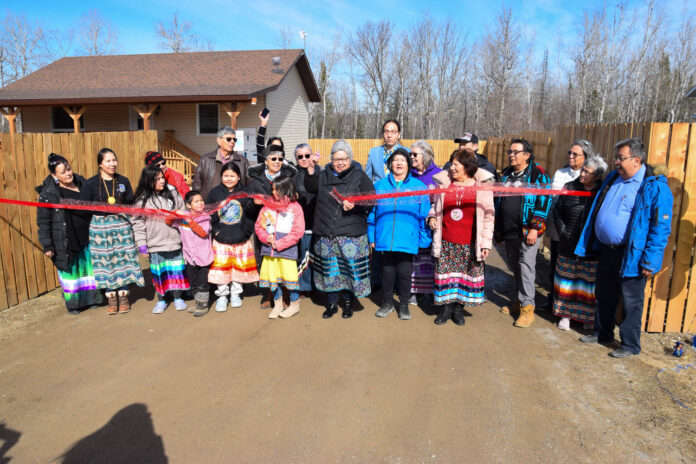ONTARIO—In an historic court decision, the Ontario Superior Court of Justice has issued a partial judgment to finalize the settlement for the past compensation in the Robinson-Huron Annuities Case.
“It is an historic agreement and decision—the court recognizes the case that had been put before it and the negotiation efforts of all the parties involved,” stated Angus Toulouse, chief of Sagamok First Nation and a Robinson-Huron Treaty Litigation Fund (RHTLF) spokesperson. “It took a long time to reach this point.”
“It’s great news,” stated Patsy Corbiere, chief of Aundeck Omni Kaning (AOK) First Nation and one of the plaintiffs in the court case. “It is a big win and quite an accomplishment. And it is an historic agreement as all parties agreed, and it gives an edict for the Canada and Ontario governments to provide $5 million each,” she said, pointing out, “there was a lot of risk in this whole process.”
“It is the largest First Nation settlement ever in Canada,” stated Chief Corbiere. “And it is about moving forward positively. It also sets the stage for a renewal of the compensation amount provided by the government, and it sets the stage for other First Nation claims such as Northern (Superior), which is going through the same type of case.”
Duke Peltier of Wiikwemkoong Unceded Territory (WUT), who was also a plaintiff in the case and on the negotiation team for RHTLF said, “it has been a long time coming. And it provides the mandate for leadership toward the implementation of the treaty.”
“It is the largest First Nation settlement in the country,” said Chief Toulouse. “We all need to celebrate this achievement. This court decision resolves the last 20 years grievance and sets the stage to move forward the treaty agreement and funds to the communities.”
“On February 26 the Chief Justice of Ontario Geoffrey B. Morawetz issued a partial judgment giving effect to the settlement agreement for past compensation effective on that date,” said Chief Toulouse. “This gives effect to the settlement agreement and is the last step before the governments pay the settlement of $10 billion dollars.” He pointed out the governments will be able to take up to 60 days to get these monies to the RHTLF.
“The judge called the settlement agreement a historic agreement and commended all the parties for concluding the negotiations,” an RHTLF release states. “By reaching this milestone we have completed all the steps required to finalize the settlement agreement. Once the RHTLF receives the funds, it will distribute the funds amongst the 21 First Nations in the territory based on the terms of the Compensation Disbursement Agreement. Each First Nation will make their own decisions on per-capita distributions and amounts to be held for collective use.”
“The $10 billion settlement that was announced in June 2023 is for past compensation only,” the RHTLF release read. “The settlement is a huge step forward towards renewing our treaty relations, but we still have to work together to resolve the future of the $4 gratuities.”
“It will be up to the communities on distribution of the funds they receive, and each will make the decision on how much each receive and how much will be held for collected use,” said Chief Toulouse.
Chief Toulouse also pointed out, “one other part deals with beneficiaries who are not currently members of the 21 communities. They will have to go through an application process and information on this will be coming out soon.”
“With the court settlement agreement, the governments will have to pay their share of the $10 billion within 60 days or interest will be accrued,” said Mr. Peltier. He pointed out as is the case with most of the First Nation communities involved, “in my community there has not been any firm decisions on where the compensation amounts will be shared. We are going through the internal process and consulting with our community members.”
“People need to understand that this is an historic agreement, and it is all about working together as communities,” said Chief Corbiere. “All members of our communities should be proud that we went through this whole process. I’m glad I was one of the plaintiffs and have been part of the negotiation litigation management team since 2011. When I started as chief, we started to put funding in place and received a loan from the Bank of Montreal to go through this litigation. It’s certainly good news that at the end of the day we won.”
Chief Corbiere said in her community, band members are being consulted on how the funds AOK receives will be shared. “People have to be open minded and move forward with the approach as to how this is going to benefit the community.”
The case resolves an aspect of a grievance that has been outstanding for 150 years and it sets the stage for renewal of the relationship going forward.
As has been reported previously, the settlement provides past compensation to Robinson Huron Treaty beneficiaries, after not seeing an increase to annual treaty payments for a period of nearly 150 years, as wealth generated in the territory through resource revenues from the mining, forestry and fishing sectors continue to grow for the province. The annual treaty payments to Anishinaabe beneficiaries, also known as annuities, have remained at $4 per person since 1875. Prior to that, the annuities were $1.60 per person.
Ontario has since taken its appeal of both the stage 1 and stage two court decisions to the Supreme Court of Canada.
During court hearings for the Supreme Court appeal this past November, Ontario argued that the treaty should be interpreted to mean that the province should determine the increase to the annuity and not the courts.
The province has also argued that awarding past compensation for historical treaty breaches is inappropriate, and the RHTLF should only be entitled to receive declarations from the court at a future hearing for stage three of the annuities claim court case.
The RHTLF has said the province has a legal obligation to increase annuity payments over time. It’s anticipated the Supreme Court will hand down a decision on the province’s appeal this year.
The First Nations included in the Robinson Huron Treaty are Atikameksheng Anishnawbek, Aundeck Omni Kaning, Batchewana First Nation, Dokis First Nation, Henvey Inlet First Nation, M’Chigeeng First Nation, Magnetawan First Nation, Mississauga First Nation, Nipissing First Nation, Garden River First Nation, Sagamok Anishinawbek, Serpent River First Nation, Shawanaga First Nation, Sheguiandah First Nation, Sheshegwaning First Nation, Thessalon First Nation, Wahnapitae First Nation, Wasauksing First Nation, Whitefish River First Nation, Wiikwemkoong Unceded Territory and Zhiibaahaasing First Nation.
The Robinson Huron Treaty was signed on September 9, 1850.
Chief Toulouse added, “the next phase of this process will be on renewal of the compensation agreement. Hopefully, this gets underway in the next few weeks with the governments.”




